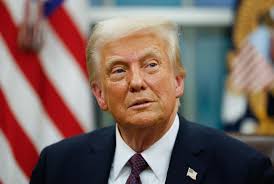
Presidency clarifies: Trump’s threat not behind NGX sell-offs
Chairman of the Presidential Committee on Tax Policy and Fiscal Reforms, Taiwo Oyedele, has refuted assertions that the recent downturn in the Nigerian capital market, which led to a loss of N4.6 trillion, was instigated by foreign investors responding to comments made by U.S. President Donald Trump regarding Nigeria.
In a statement, he also mentioned that disposals made within a 12-month period, with total proceeds not exceeding N150 million and total gains not surpassing N10 million, would be exempt from Capital Gains Tax starting January 1, 2026.
During an appearance on Channels Television’s Business Morning yesterday, Oyedele clarified that the variations in the Nigerian Exchange, NGX, are part of standard market cycles, rather than politically motivated sell-offs.
"The capital market is consistently characterized by fluctuations. Even following the sell-off yesterday (Tuesday), returns remain modest at approximately 40 percent, and in dollar terms, around 50 percent. This continues to be one of the best-performing markets globally, and we aspire for it to improve further. However, no market experiences perpetual growth."
He pointed out that investors typically realize profits after prolonged periods of gains, resulting in temporary declines, which should not be misconstrued as panic reactions.
"The issue we have created is that after an extended period of gains and a few days of downturns, individuals began attributing it to two factors: the capital gains tax, which is inaccurate, and Trump’s remarks regarding Nigeria in relation to the genocide comment," he stated.
Oyedele further remarked that if any sell-offs were indeed swayed by Trump’s comments, "those individuals would likely be foreign investors, as Nigerian investors would not divest due to Trump. Otherwise, where would they relocate their investments?"
He underscored that since foreign investors are not withdrawing from the market, the recent decline cannot be linked to external political pressures.
“It’s just a normal market cycle where prices go up and down. Once we attribute them wrongly, it drives unnecessary sentiment,” he said. Sales not exceeding N150m within 12 months’ll be exempted from capital gains tax
In a separate statement issued in Abuja yesterday, Oyedele said disposal of sales with total proceeds not exceeding N150 million and total gains not in excess of N10 million, would be exempted from capital gains tax with effect from January 1, 2026.
He said the clarification became necessary due to what he described as “misinformation” on the subject in public discuss.
He said: “Recent discussions around the impact of the Capital Gains Tax, CGT, reform on the capital market have included some misinterpretations and misinformation.”
“While detailed implementation guidelines will be provided through official regulations, it is important to clarify the critical issues at this stage.”
According to him, the new CGT framework represents a major improvement over the existing law and that “the reform makes investment in the Nigerian capital market more attractive, reduces investment risk and ensures fair treatment of legitimate costs incurred by investors.”
According to him, exemptions will include “disposals within 12 months where total sales proceeds do not exceed ¦ 150 million and total gains do not exceed ¦ 10 million.
“Reinvestment of proceeds into shares of Nigerian companies within 12 months qualifies for full exemption where the exemption threshold is exceeded.
“Capital gains from foreign share disposals that are repatriated into Nigeria through CBN-authorised channels.
“Institutional investors that enjoy corporate income tax exemption such as PFAs, REITs and NGOs are also exempted from CGT.
“Small companies with turnover not exceeding ¦ 100 million and total fixed assets not more than ¦ 250 million pay 0% CGT.
“Gains from investment in a labeled startup by venture capitalist, private equity fund, accelerators or incubators.”
The committee chairman added that key changes would include replacing the flat 10% CGT rate with progressive income tax rates, ranging from 0% to 30%, depending on the investor’s overall income or profit level.
“The top rate of 30%, which applies to large corporate investors, is expected to be reduced to 25% under the broader corporate tax reform.
“Investors may now deduct certain costs that were previously disallowed under the old CGT regime, ensuring that they are not taxed on a net loss position.”
He said for the purpose of CGT, effective from 1 January 2026, the cost base for existing investments would be reset to the higher of: the actual acquisition cost; and the closing market price as at December 31, 2025.
According to him, “this ensures fairness and prevents the application of the new rule to gains accrued before the new law takes effect.”





